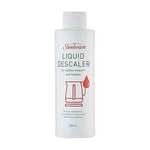- For all coffee makers and kettles.
- Removes scale build up to restore the efficiency of your appliance.
- Prolongs the life of your appliance
- Package Dimensions: 5.1 L X 15.9 H X 5.1 W (centimeters)
Sunbeam KE0100 Liquid Descaler 250ml $5 + Delivery ($0 with Prime/ $59 Spend) @ Amazon AU
Last edited 26/08/2025 - 11:07 by 1 other user
 CamelCamelCamel.
CamelCamelCamel.Related Stores
closed Comments

I picked up 88% lactic acid solution from a Home Brewing shop and diluted it down to match the ecodecaulk solution.
Ends up being c. $0.50 per descale cycle for the exact same solution and results.
Much better than the DIY citric acid or vinegar solutions floating around which would require more rinsing and/or leave an aftertaste.

Thank you! Just purchased 2 🙂

Costs more than white vinegar.

The negative of Vinegar is that it smells like Vinegar. Label on this product says it contains between 5 - 15% citric acid, if you already have that just make up your own solution.

Lemon juice is 5-7% citric acid

i switched to this when i stopped prime - cheaper too
https://www.coles.com.au/product/coles-coffee-machine-descal…

looks like its much more dilute, no? half a bottle of this = one cap of the sunbeam stuff?

from my use and reading their instructions i felt the sunbeam descaler was more designed for kettles and percolators/dripulators - i felt the a capful didnt work so well on a coffee machine - so i used half a bottle in a full tank of water - like i did with the delonghi descaler liquid before that
am not an expert - so i could be wrong

I use a heaped teaspoon of citric acid and boil the kettle. Works like a charm.

I straight up put some cut up lemon into my kettle and boil it. Works great too!
Basically the same ingredient haha

Have worked in catering, this is the way many places maintain appliances eg hot water urns etc. works well and cheap!

This deal is off the scale

What scale?

Limescale which can only be defeated by lemon

Why cant I use a lime?

Can you use this in a standard expresso machine with a handle? Or is it bad for the water lines/boiler?

I've never seen this 'standard expresso machine'
If you are talking about an espresso machine I don't think there's a standard template for them either.
It's lemon juice, spritz some on the machine and see if it melts.

Do yourself a favour and buy some citric acid, so u can do all of it.

What's the concentrate? Ratio to water?

1 or 2 tablespoons per litre of water. Start with 15g/1000mL for normal descaling, if its bad use 30g.

@JSONBourne: Thats why I would start with the softer dilution and yes do flush. Its not very different to boiling water with lemon juice, but also won't smell like vinegar.

Convenient, my machine is currently running a cycle with the last of my descaling liquid.

thanks op, but is this good enough for the LOR espresso machines?

I have this. On the bottle it shows citric acid of 5-15%!
That is a ridiculously wide range. You don't know what you are getting!As I had it: -
To descale my automatic coffee machine, I assumed 10% so used half a bottle in the water container which holds around 1L water.
Did it work - who knows?
But the instruction says, a cap full while I tried 2 cups as this works like a charm for kettle,
Still unsure how much I should use

Just note that you're paying a LOT for the convenience of someone dissolving a little bit of citric acid in water for you. Woolies sells citric acid for $5 for 150g, which would make up 1.5L of solution at 10% strength. Or go online and buy citric acid in bulk for around $10 per kg.

Or to put it another way, you're paying $5 for 25g of citric acid and water. Literally nothing else. That's $200 per kg of citric acid.

You can buy Citric acid for under $50 for 5kg, or around $15 for 1kg.

For kettles, you can hugely reduce the amount of limescale that forms, simply by emptying the kettle of water straight after you've poured your cuppa.
Here's why it works:
Your tap water has dissolved minerals in it. Possibly even a saturated solution if you're in an area with very hard water.When you boil your kettle, the steam that comes out of the kettle is pure water. The minerals stay behind in the kettle, where they become more and more concentrated due to the steam and due to evaporation. As the water remaining in your kettle cools down, the water becomes less able to "hold" the dissolved minerals (*), and they deposit as scale.
So after you've made your cuppa, and while the remaining water is still hot, just empty the kettle. All the minerals go down the sink instead of depositing as scale inside your kettle. No water in the kettle = no minerals inside the kettle = no scale forming inside the kettle. Don't let the water cool down before you empty the kettle, the scale will have already deposited.
You'll probably still get a tiny bit of scale forming, as most kettles can't be completely emptied of water, there's always a few drops left. But the scale forms so slowly that descaling will become a rare thing - and I say that as a person from Brisbane, that has some of the hardest water in Australia!
Note that you don't have to tip the water down the sink, I tip mine into a clear plastic jug and keep it for drinking water (in Brisbane, boiled and cooled water tastes significantly better than tap water). If you keep "topping up" the jug with batches of left-over water from the kettle, occasionally you'll see little flakes of scale drifting around the bottom of the clear plastic jug, which means it's time to wash the jug. The flakes just pour out with the water.
(*) Chemistry 101: hot liquids can hold more solids dissolved in them, than the same volume of cold liquid. LINK




nice find, cheaper than the De'Longhi | EcoDecalk 500ml which is about $20